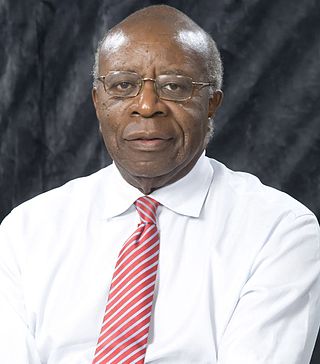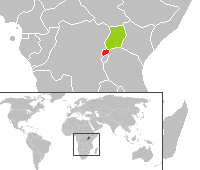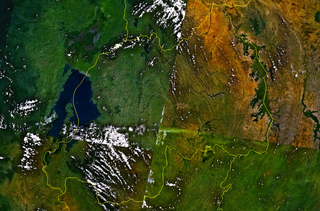
Juvénal Habyarimana was a Rwandan politician and military officer who served as the second president of Rwanda, from 1973 until his assassination in 1994. He was nicknamed Kinani, a Kinyarwanda word meaning "invincible".

The United Nations Assistance Mission for Rwanda (UNAMIR) was established by United Nations Security Council Resolution 872 on 5 October 1993. It was intended to assist in the implementation of the Arusha Accords, signed on 4 August 1993, which was meant to end the Rwandan Civil War. The mission lasted from October 1993 to March 1996. Its activities were meant to aid the peace process between the Hutu-dominated Rwandese government and the Tutsi-dominated rebel Rwandan Patriotic Front (RPF). The UNAMIR has received much attention for its role in failing, due to the limitations of its rules of engagement, to prevent the Rwandan genocide and outbreak of fighting. Its mandate extended past the RPF overthrow of the government and into the Great Lakes refugee crisis. The mission is thus regarded as a major failure.

Faustin Twagiramungu was a Rwandan politician. He was Prime Minister of Rwanda from 1994 until his resignation in 1995, the first head of government appointed after the Rwandan Patriotic Front (RPF) captured Kigali. He soon came to disagree with the RPF's policies and actions, resigned and was placed under house arrest, but managed to leave the country and settle in Belgium. He continued his opposition activity against Paul Kagame's rule, subsequently returning to Rwanda and standing for elections, but without success.
Agathe Uwilingiyimana, sometimes known as Madame Agathe, was a Rwandan political figure. She served as Prime Minister of Rwanda from 18 July 1993 until her assassination on 7 April 1994, during the opening stages of the Rwandan genocide. She was also Rwanda's acting head of state in the hours leading up to her death.
The Arusha Accords, officially the Peace Agreement between the Government of the Republic of Rwandaand the Rwandan Patriotic Front, also known as the Arusha Peace Agreement or Arusha negotiations, were a set of five accords signed in Arusha, Tanzania on 4 August 1993, by the government of Rwanda and the rebel Rwandan Patriotic Front (RPF), under mediation, to end a three-year Rwandan Civil War. Primarily organized by the Organisation of African Unity and the heads of state in the African Great Lakes region, the talks began on 12 July 1992, and ended on 4 August 1993, when the accords were finally signed.

The Burundian Civil War was a civil war in Burundi lasting from 1993 to 2005. The civil war was the result of longstanding ethnic divisions between the Hutu and the Tutsi ethnic groups. The conflict began following the first multi-party elections in the country since its independence from Belgium in 1962, and is seen as formally ending with the swearing-in of President Pierre Nkurunziza in August 2005. Children were widely used by both sides in the war. The estimated death toll stands at 300,000.
Joseph Kavaruganda was a Rwandan jurist who served as president of Rwanda's Constitutional Court. He was killed at the beginning of the Rwandan genocide.

The assassination of presidents Juvénal Habyarimana and Cyprien Ntaryamira in the evening of April 6, 1994 was the proximate trigger for the Rwandan genocide, which resulted in the murder of approximately 800,000 Tutsi and a smaller number of moderate Hutu. The first few days following the assassinations included a number of key events that shaped the subsequent course of the genocide. These included: the seizing of power by an interim government directed by the hard-line Akazu clique; the liquidation of opposition Hutu politicians; the implementation of plans to carry out a genocide throughout the country; and the murder of United Nations peacekeepers, contributing to the impulse of the international community to refrain from intervention.

The Amahoro Stadium, officially known as Amahoro National Stadium, is a multi-purpose stadium in the Gasabo district of Kigali, Rwanda. With a capacity of 45,000, it is the largest stadium in Rwanda and hosts football matches, concerts, and public events. The football clubs Armée Patriotique Rwandaise F.C. and Rayon Sports F.C. are the tenants. The venue is also sometimes used for rugby union.
Augustin Ndindiliyimana is a former Rwandan General and Chief of the Rwandan National Gendarmerie. He was convicted of genocide by the International Criminal Tribunal for Rwanda but he was acquitted by the tribunal upon appeal.

The Constitution of Rwanda was adopted by referendum on May 26, 2003. It replaced the Constitution of 1991.

Colonel Luc Marchal is a retired officer of the armed forces of Belgium. He is known for being the senior officer in the Belgian peacekeeping contingent during the 1994 Rwandan genocide, as well as the United Nations Assistance Mission for Rwanda (UNAMIR) sector commander for the capital Kigali.

United Nations Security Council resolution 846, adopted unanimously on 22 June 1993, after reaffirming Resolution 812 (1993) on the situation in Rwanda and noting a report by the Secretary-General Boutros Boutros-Ghali, the council established the United Nations Observer Mission Uganda–Rwanda (UNOMUR) for an initial period of six months.

United Nations Security Council resolution 872, adopted unanimously on 5 October 1993, after reaffirming resolutions 812 (1993) and 846 (1993) on the situation in Rwanda and Resolution 868 (1993) on the security of United Nations operations, the council stressed the need for an international force in the country and therefore established the United Nations Assistance Mission for Rwanda (UNAMIR).

United Nations Security Council resolution 891, adopted unanimously on 20 December 1993, after reaffirming resolutions 812 (1993), 846 (1993) and 872 (1993) on the situation in Rwanda, the Council noted that the presence of the United Nations Observer Mission Uganda–Rwanda (UNOMUR) had contributed to the stability of the area and extended its mandate for an additional six months.

United Nations Security Council resolution 893, adopted unanimously on 6 January 1994, after reaffirming resolutions 812 (1993), 846 (1993), 872 (1993) and 891 (1993) on Rwanda, the Council noted that the situation in Rwanda could have implications for neighbouring Burundi and authorised the deployment of a second military battalion of the United Nations Assistance Mission for Rwanda (UNAMIR) to the demilitarised zone.

United Nations Security Council resolution 909, adopted unanimously on 5 April 1994, after reaffirming resolutions 812 (1993), 846 (1993), 872 (1993), 891 (1993) and 893 (1994) on Rwanda, the Council expressed concern at deteriorating security and humanitarian situation in the country, particularly in Kigali, and extended the mandate of the United Nations Assistance Mission for Rwanda (UNAMIR) until 29 July 1994.

United Nations Security Council resolution 912, adopted unanimously on 21 April 1994, after reaffirming all resolutions on the situation in Rwanda, particularly resolutions 872 (1993) and 909 (1994), the council expressed its alarm and condemnation of the large-scale violence in the country which resulted in the death of thousands of innocent civilians, and proposed a revised mandate of the United Nations Assistance Mission for Rwanda (UNAMIR).
The following lists events that happened during 1993 in Rwanda.
Arusha Accords refers to two separate political agreements, negotiated in Arusha, Tanzania:













